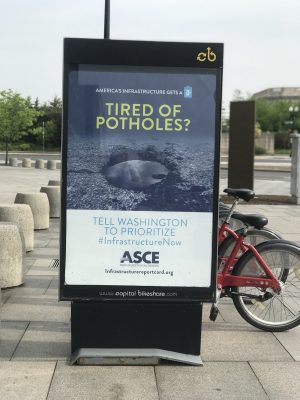 As bumpy as our streets may seem these days, our federal leaders seemed to have smoothed things out on the topic of infrastructure this past week. On April 30th, President Trump, Speaker of the House Nancy Pelosi, and Senate Minority Leader Chuck Schumer met to discuss a $2 trillion comprehensive bipartisan infrastructure package for the nation, though no funding agreement was made. This meeting comes one day after the two Democratic congressional leaders sent a formal letter to the President with an outline of their infrastructure priorities, including the need for new revenue, as well as the inclusion of clean energy and resiliency in any such package, among others.
As bumpy as our streets may seem these days, our federal leaders seemed to have smoothed things out on the topic of infrastructure this past week. On April 30th, President Trump, Speaker of the House Nancy Pelosi, and Senate Minority Leader Chuck Schumer met to discuss a $2 trillion comprehensive bipartisan infrastructure package for the nation, though no funding agreement was made. This meeting comes one day after the two Democratic congressional leaders sent a formal letter to the President with an outline of their infrastructure priorities, including the need for new revenue, as well as the inclusion of clean energy and resiliency in any such package, among others.
ASCE released a statement on this meeting by ASCE President Robin Kemper, PE, which showed encouragement by the meeting, but a sense of urgency for Congress to act. Part of the statement read, “The American Society of Civil Engineers was thrilled to see President Trump, House Speaker Pelosi, and Senate Democratic Leader Schumer move beyond the political gridlock to discuss solutions for our nation’s deteriorating infrastructure. Now that they’ve taken the first step and proposed a $2 trillion investment solution, it’s time for Congress to act.”
The trio has agreed to meet again in three weeks to discuss specific policy proposals and financing. This effort comes a little over a year after President Trump unveiled an infrastructure plan to generate $1.5 trillion in investment, with an emphasis on the need for federal dollars to be leveraged by state and local government funding, as well as private sector investment and a desire to streamline the permitting and approval process to no more than two years. The meeting also comes on the heels of the President’s statement at the State of the Union address earlier this year: “Both parties should be able to unite for a great rebuilding of America’s crumbling infrastructure.” After the meeting, Speaker Pelosi mentioned how pleased she and Senator Schumer were with the bipartisanship on this issue, and cited ASCE in her statement, when talking about the infrastructure deficit we have.
ASCE’s 2017 Infrastructure Report Card gave the nation’s overall infrastructure a grade of “D+” with an investment gap of $2 trillion. ASCE believes that increased investment amongst all levels of government and the private sector is the key solution to raise the grades and improve our nation’s infrastructure.
Additionally, recent polling continues to show that increasing infrastructure spending is one of the top priorities for the 116th Congress. 79% of the people polled stated it is “extremely important.” ASCE believes infrastructure legislation should address the following priorities:
- fix the Highway Trust Fund by raising the federal gas tax, which hasn’t seen an increase since 1993;
- increase the cap on the Passenger Facility Charge to modernize our nation’s airports;
- ensure all funds in the Harbor Maintenance Trust Fund are utilized for our nation’s ports; and
- support key financing tools such as tax-exempt municipal bonds and advance refunding.
If Congress and the President can agree on a way to pay for this plan, American families will start to feel a difference – literally. An infrastructure bill means more time at home with your family – shorter commutes in many cases and more options and choices for getting around – whether that be by car, bus, rail, or bike. We need to get cones on the ground, cranes in the air, and workers deployed to projects.
ASCE members and staff have been active speaking to media throughout the week on what these discussions mean for the future of our nation’s infrastructure. Media interviews include NPR, CNN, MSNBC, WJLA, and more.
